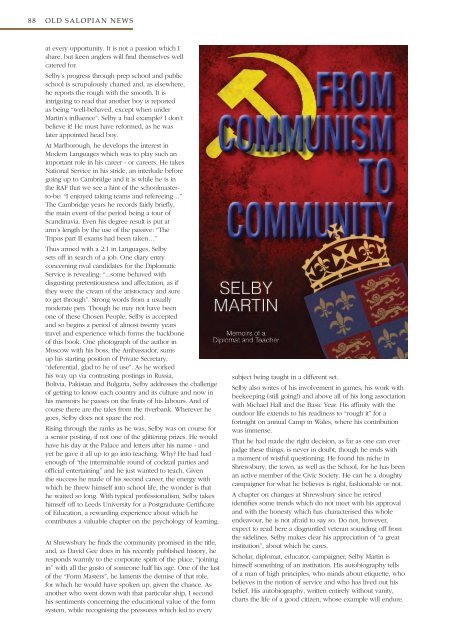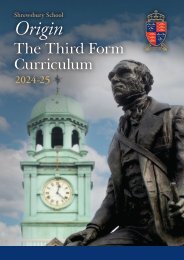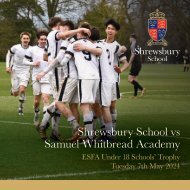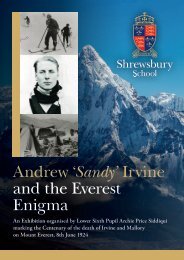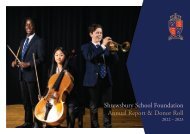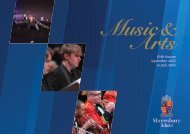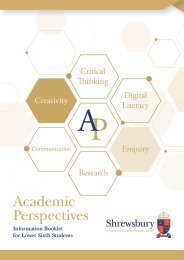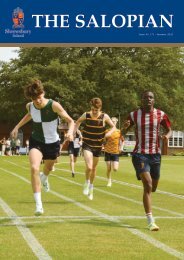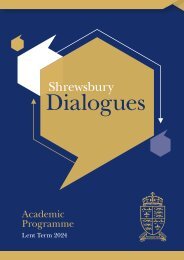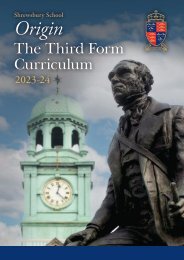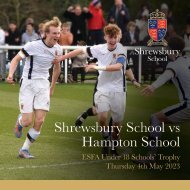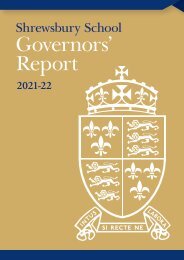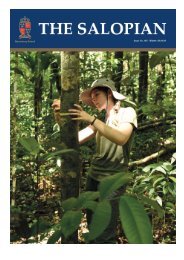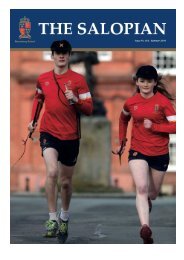The Salopian no. 160 - Summer 2017
- No tags were found...
You also want an ePaper? Increase the reach of your titles
YUMPU automatically turns print PDFs into web optimized ePapers that Google loves.
88 OLD SALOPIAN NEWS<br />
at every opportunity. It is <strong>no</strong>t a passion which I<br />
share, but keen anglers will find themselves well<br />
catered for.<br />
Selby’s progress through prep school and public<br />
school is scrupulously charted and, as elsewhere,<br />
he reports the rough with the smooth. It is<br />
intriguing to read that a<strong>no</strong>ther boy is reported<br />
as being “well-behaved, except when under<br />
Martin’s influence”. Selby a bad example? I don’t<br />
believe it! He must have reformed, as he was<br />
later appointed head boy.<br />
At Marlborough, he develops the interest in<br />
Modern Languages which was to play such an<br />
important role in his career - or careers. He takes<br />
National Service in his stride, an interlude before<br />
going up to Cambridge and it is while he is in<br />
the RAF that we see a hint of the schoolmasterto-be:<br />
“I enjoyed taking teams and refereeing…”<br />
<strong>The</strong> Cambridge years he records fairly briefly,<br />
the main event of the period being a tour of<br />
Scandinavia. Even his degree result is put at<br />
arm’s length by the use of the passive: “<strong>The</strong><br />
Tripos part II exams had been taken…”<br />
Thus armed with a 2:1 in Languages, Selby<br />
sets off in search of a job. One diary entry<br />
concerning rival candidates for the Diplomatic<br />
Service is revealing: “...some behaved with<br />
disgusting pretentiousness and affectation, as if<br />
they were the cream of the aristocracy and sure<br />
to get through”. Strong words from a usually<br />
moderate pen. Though he may <strong>no</strong>t have been<br />
one of these Chosen People, Selby is accepted<br />
and so begins a period of almost twenty years<br />
travel and experience which forms the backbone<br />
of this book. One photograph of the author in<br />
Moscow with his boss, the Ambassador, sums<br />
up his starting position of Private Secretary,<br />
“deferential, glad to be of use”. As he worked<br />
his way up via contrasting postings in Russia,<br />
Bolivia, Pakistan and Bulgaria, Selby addresses the challenge<br />
of getting to k<strong>no</strong>w each country and its culture and <strong>no</strong>w in<br />
his memoirs he passes on the fruits of his labours. And of<br />
course there are the tales from the riverbank. Wherever he<br />
goes, Selby does <strong>no</strong>t spare the rod.<br />
Rising through the ranks as he was, Selby was on course for<br />
a senior posting, if <strong>no</strong>t one of the glittering prizes. He would<br />
have his day at the Palace and letters after his name - and<br />
yet he gave it all up to go into teaching. Why? He had had<br />
e<strong>no</strong>ugh of “the interminable round of cocktail parties and<br />
official entertaining” and he just wanted to teach. Given<br />
the success he made of his second career, the energy with<br />
which he threw himself into school life, the wonder is that<br />
he waited so long. With typical professionalism, Selby takes<br />
himself off to Leeds University for a Postgraduate Certificate<br />
of Education, a rewarding experience about which he<br />
contributes a valuable chapter on the psychology of learning.<br />
At Shrewsbury he finds the community promised in the title,<br />
and, as David Gee does in his recently published history, he<br />
responds warmly to the corporate spirit of the place, “joining<br />
in” with all the gusto of someone half his age. One of the last<br />
of the “Form Masters”, he laments the demise of that role,<br />
for which he would have spoken up, given the chance. As<br />
a<strong>no</strong>ther who went down with that particular ship, I second<br />
his sentiments concerning the educational value of the form<br />
system, while recognising the pressures which led to every<br />
subject being taught in a different set.<br />
Selby also writes of his involvement in games, his work with<br />
beekeeping (still going!) and above all of his long association<br />
with Michael Hall and the Basic Year. His affinity with the<br />
outdoor life extends to his readiness to “rough it” for a<br />
fortnight on annual Camp in Wales, where his contribution<br />
was immense.<br />
That he had made the right decision, as far as one can ever<br />
judge these things, is never in doubt, though he ends with<br />
a moment of wistful questioning. He found his niche in<br />
Shrewsbury, the town, as well as the School, for he has been<br />
an active member of the Civic Society. He can be a doughty<br />
campaigner for what he believes is right, fashionable or <strong>no</strong>t.<br />
A chapter on changes at Shrewsbury since he retired<br />
identifies some trends which do <strong>no</strong>t meet with his approval<br />
and with the honesty which has characterised this whole<br />
endeavour, he is <strong>no</strong>t afraid to say so. Do <strong>no</strong>t, however,<br />
expect to read here a disgruntled veteran sounding off from<br />
the sidelines. Selby makes clear his appreciation of “a great<br />
institution”, about which he cares.<br />
Scholar, diplomat, educator, campaigner, Selby Martin is<br />
himself something of an institution. His autobiography tells<br />
of a man of high principles, who minds about etiquette, who<br />
believes in the <strong>no</strong>tion of service and who has lived out his<br />
belief. His autobiography, written entirely without vanity,<br />
charts the life of a good citizen, whose example will endure.


